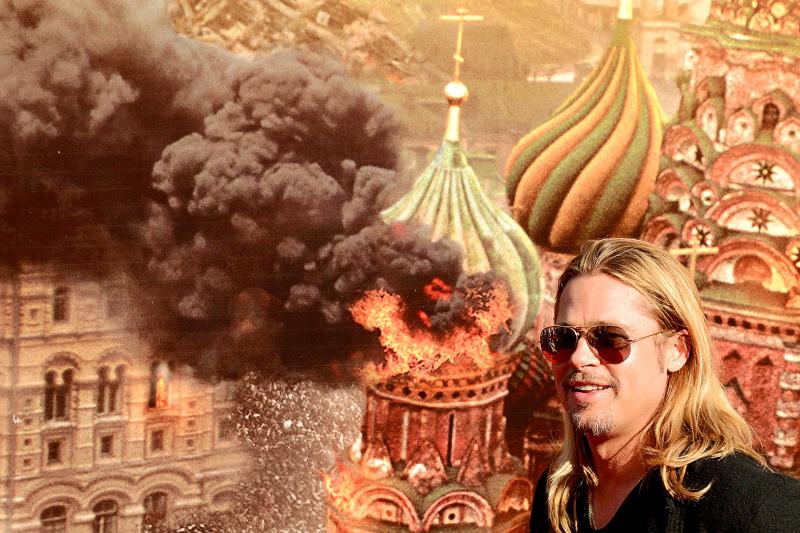The lure of the massive Chinese market has led Hollywood to readily self-censor its films to please Beijing, according to a new report by Pen America, an anti-censorship group.
Screenwriters, producers and directors in the huge US film industry are changing scripts, deleting scenes and altering other content, afraid of offending Chinese censors who control the gateway to the country’s 1.4 billion consumers, according to the report released Wednesday.
The actions include everything from deleting the Taiwanese flag from Tom Cruise’s bomber jacket in the upcoming Top Gun: Maverick, to removing China as the source of a zombie virus in 2013’s World War Z.

Photo: AFP
But it also means completely avoiding sensitive issues including Tibet, Taiwan, Hong Kong politics, Xinjiang and the portrayal of LGBTQ characters, the report said.
Faced with blacklisting and other punitive measures, Hollywood producers are even censoring films not targeting the Chinese market, in order to not impact others planned for Chinese theaters, Pen America says.
“Steadily, a new set of mores has taken hold in Hollywood, one in which appeasing Chinese government investors and gatekeepers has simply become a way of doing business,” the report said.
LUCRATIVE MARKET
Pen is a global organization which speaks out for the protection of freedom of expression for writers and artists worldwide. It says Beijing enforces one of the world’s most restrictive censorship systems, and numerous members of the group’s China arm have been jailed, including Nobel Peace Prize laureate Liu Xiaobo (劉曉波), who died in 2017 while serving an 11 year prison sentence.
Censorship is now centralized under the Chinese Communist Party’s Central Propaganda Department, which decides whether a foreign film gets access to what is soon to be the world’s largest movie market.
Only a handful of foreign films are released in China each year.
The market’s importance is clear. Hollywood films like Avengers: Endgame and Spider-Man: Far from Home< made more money in China than in the US.
“The Chinese Communist Party, in fact, holds major sway over whether a Hollywood movie will be profitable or not — and studio executives know it,” the report said.
That explained why former Disney chief executive Michael Eisner apologized to Beijing after it banned the 1997 film Kundun about the Tibetan Dalai Lama, the report said.
And Richard Gere — star of the 1997 thriller Red Corner, which depicted a corrupt Chinese justice system, and a vocal advocate for human rights in Tibet — has said Hollywood producers avoid him so as to not provoke Beijing.
Increasingly, the report said, Hollywood people “voluntarily internalize these strictures, even without being asked.”
Some even invite Chinese censors onto film sets.
One Hollywood producer told Pen: “If you come up with a project that is actively critical,” the fear is that “you or your company will actively be blacklisted, and they will interfere with your current or future project.”
Pen warned that acquiescence to Chinese censorship could become “a new normal” in countries proud of their free speech protections.
“Hollywood’s approach to acceding to Chinese dictates is setting a standard for the rest of the world,” it warned.

Taiwan has next to no political engagement in Myanmar, either with the ruling military junta nor the dozens of armed groups who’ve in the last five years taken over around two-thirds of the nation’s territory in a sprawling, patchwork civil war. But early last month, the leader of one relatively minor Burmese revolutionary faction, General Nerdah Bomya, who is also an alleged war criminal, made a low key visit to Taipei, where he met with a member of President William Lai’s (賴清德) staff, a retired Taiwanese military official and several academics. “I feel like Taiwan is a good example of

March 2 to March 8 Gunfire rang out along the shore of the frontline island of Lieyu (烈嶼) on a foggy afternoon on March 7, 1987. By the time it was over, about 20 unarmed Vietnamese refugees — men, women, elderly and children — were dead. They were hastily buried, followed by decades of silence. Months later, opposition politicians and journalists tried to uncover what had happened, but conflicting accounts only deepened the confusion. One version suggested that government troops had mistakenly killed their own operatives attempting to return home from Vietnam. The military maintained that the

Jacques Poissant’s suffering stopped the day he asked his daughter if it would be “cowardly to ask to be helped to die.” The retired Canadian insurance adviser was 93, and “was wasting away” after a long battle with prostate cancer. “He no longer had any zest for life,” Josee Poissant said. Last year her mother made the same choice at 96 when she realized she would not be getting out of hospital. She died surrounded by her children and their partners listening to the music she loved. “She was at peace. She sang until she went to sleep.” Josee Poissant remembers it as a beautiful

Before the last section of the round-the-island railway was electrified, one old blue train still chugged back and forth between Pingtung County’s Fangliao (枋寮) and Taitung (台東) stations once a day. It was so slow, was so hot (it had no air conditioning) and covered such a short distance, that the low fare still failed to attract many riders. This relic of the past was finally retired when the South Link Line was fully electrified on Dec. 23, 2020. A wave of nostalgia surrounded the termination of the Ordinary Train service, as these train carriages had been in use for decades